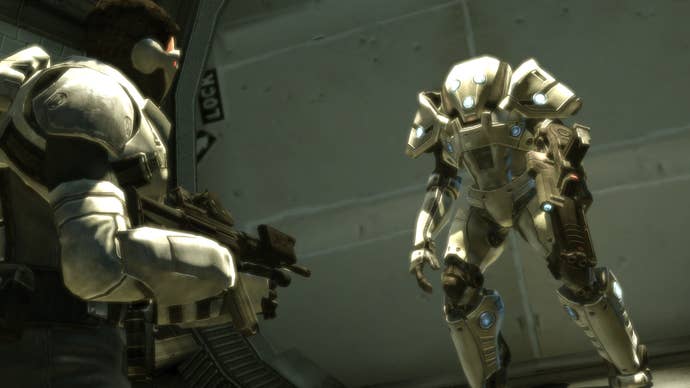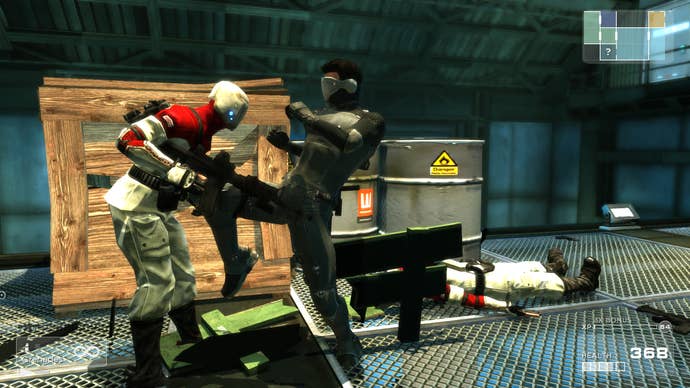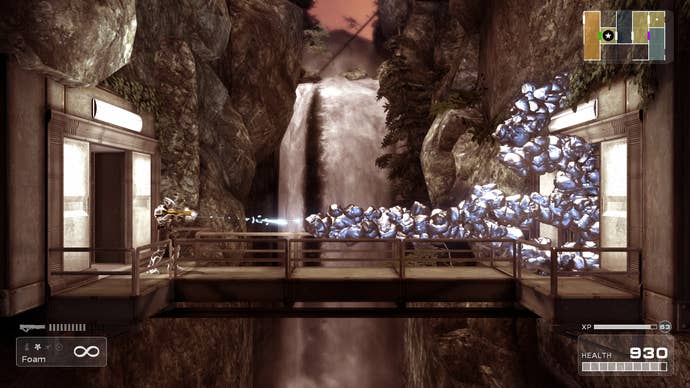Shadow Complex Remastered Xbox One Review: Shadow Complex Reconsidered
How does Chair's trendsetting action game hold up seven years after its original debut?
This article first appeared on USgamer, a partner publication of VG247. Some content, such as this article, has been migrated to VG247 for posterity after USgamer's closure - but it has not been edited or further vetted by the VG247 team.
People have been asking for a sequel to 2009's Xbox 360 metroidvania adventure Shadow Complex for years, only to be met by regretful denials and a hard-to-deny reality: Developer Chair made an awful lot more money from its breakout iOS hit Infinity Blade series than any Shadow Complex sequel could hope to bring in.
Still, all hope hasn't been lost, as Chair has finally circled back around to the series. Shadow Complex Remastered isn't a sequel or even a remake — so far as I've been able to tell, the only change to the campaign mode at all involves the visuals — but with this sort of reissue there's always the subtext of future hope. If the remaster does well enough, maybe it could open the door to a sequel, right? Maybe, maybe not; for now, the more important question is whether or not Shadow Complex Remastered even merits to do well at all. Is this seven-year-old action game worth playing, when there have been so, so many games to follow in the years since that have hit the exact same beats Chair did?

As remasters go, Shadow Complex's is fairly no-frills. It adds some bloom lighting and a few other current-gen visual effects, but doesn't do anything to smooth over the rough patches. The game still looks tragically last-gen in close-up scenes, such as those obligatory melee kill quick-cuts and the handful of story sequences sprinkled throughout the adventure. That's all just aesthetics, though; more disappointing is the residual clunkiness of the control scheme. Certain actions feel every bit as clumsy as they did the first time around, such as dropping off ladders, which never seems to work the same way twice. Likewise, the murkiness of aiming in three dimensions in what ultimately amounts to a 2D game continues to be as functionally awkward as it is conceptually clever.
The game also stutters and jerks around a lot more than I'd expect from an Xbox One title. Enemies have a weird habit of suddenly disappearing for a split-second only to reappear in a new position, and the screen skips quite frequently while scrolling. I don't recall if these issues were present in the original Shadow Complex, but they seem more egregious in this version... especially since you can already play the original game on Xbox One through its backward-compatibility feature. The one entirely new addition this release offers over the original is a new trial mode, which seems heavily geared toward the type of player who pursues speed runs. Honestly, I don't feel Shadow Complex's controls and design are precise or refined enough to lend themselves to the challenges offered here, but your mileage may vary.
I suspect I'm coming off a lot more critical than Shadow Complex Remaster properly deserves, though. While I'm not particularly impressed with the conversion, the underlying game is quite good — better than I gave it credit for at the time of its original release, honestly. Revisiting it with more than half a decade of perspective under my belt has given me new appreciation for what chair created here.
The elevator pitch for Shadow Complex would probably consist of something like, "Imagine Super Metroid but as an American political thriller that takes heavy gameplay cues from Gears of War." That's a pretty outlandish combination, but it works. Shadow Complex puts its Unreal Engine graphics to work by presenting players with direct character controls restricted to a two-dimensional plane, as with any classic 16-bit side-scroller, while introducing some limited z-axis interaction into the environments. Now, you can't stray outside the active 2D plane, even when it would make sense to do so (as when spiraling staircases appear — you have to navigate them by jumping from landing to landing rather than by simply climbing the stairs, as you can't interact with the portions that exist in the background). Enemies and other interactive elements, on the other hand, can break the plane and wander along pathways in the background.

So while Protagonist Jason lives in the second dimension, he can shoot in the third. Your weapons have an auto-aim function that allows you to draw a bead on bad guys in the distance, and the big shoot-outs here feel much larger than would be possible in a strictly 2D game. Your foes can fire at you from anywhere on-screen, including off in the distance on faraway portions of buildings, and this adds a sense of scale to the combat — something that typically feels far more mundane in games of this type. As you gain more powers and tools, you gain the ability to mix up your gunplay with subweapons and special moves. This does have the side effect of leaving the bad guys terribly overmatched, but that doesn't make Shadow Complex any different than the vast majority of metroidvania adventures, which tend to apply a reverse difficulty curve to help enhance the player's sense of empowerment as they advance.
Despite some fussy moments when it comes to fine movements, all of this works together to make Shadow Complex a quick, breezy action experience. You can select several higher difficulty levels if you find the core game too much of a cakewalk, but for the most part the focus here rests more on exploration than on shooting anyway. The inclusion of the third dimension as a consideration for combat helps set the action apart, and the modern-day (or near-future) setting distinguishes Shadow Complex from the hard sci-fi or fantasy settings more common to the genre. Despite the recent proliferation of indie metroidvanias, there's something unusual and charming about traipsing through the woods and caves of Washington... then revisiting those lush environments later on, when your generic hiker dude has upgraded himself into a one-man engine of annihilation.
Really, I surprised myself with how much I enjoyed Shadow Complex upon revisiting it — more than I did the first time around, honestly. When I reviewed the original game, I found myself a bit hung up on just how closely Chair imitated Super Metroid. Everything from the opening scenes — which consists of a high-octane prologue leading into a low-key, lower-power jaunt as you trip across dormant security cameras and begin the real adventure — to the color-coded environmental weak points keyed to your various weapons and tools felt lifted directly from Nintendo's Super NES classic. Not so much "inspired by" as "pilfered shamelessly from."
And really, that hasn't changed. What has changed, however, is the context surrounding Shadow Complex. At the time, I'd never played a game that so brazenly copied Super Metroid; today, on the other hand, I've played probably a dozen. I didn't realize back in 2009 that Shadow Complex wasn't so much an act of design larceny as it was the transformation of a single video game into a formula, arguably even a small genre. Everything about Super Metroid, from its tool set to its structure and progression to its atmosphere, has been copied and codified and transformed into a blueprint for a minor legion of video games. It's easier to be forgiving of Shadow Complex's willingness to wear its influences on its sleeve now that so many other developers have done exactly the same thing... and rarely with as much finesse as Chair demonstrated.
For every top-tier Super Metroid-like game that's come down the pipeline, such as Axiom Verge or Guacamelee, we've seen far more middling-to-poor attempts like Strider (that would be "middling") Castlevania Lords of Shadow: Mirror of Fate (which was straight-up poor). The indie game space is littered with half-finished and unimaginative Super Metroid clones. Shadow Complex simply got their first; and unlike most of the stragglers, it demonstrated some genuine invention. With its half-tucked hero and cover-based shooting, the game feels inescapably locked to a largely bygone era of game design... but at the same time, those same traits help elevate it above dozens of lesser works that followed in its footsteps.

Likewise, the controversy over Shadow Complex's premise seems like a tempest in a teakettle today. The game had the poor fortune to have had Orson Scott Card's name attached to it right around the time a vocal portion of the Internet community rose up to decry Card's views on social issues like gay marriage. Yet while the game undeniably has political subtext — it opens with the assassination of the Vice-President by a highly advanced paramilitary group, after all — it's hard to say what precisely that subtext is meant to be. The game was developed at the tail end of Bush's unpopular second term, released shortly after Obama took office, and is being reissued in the midst of the weirdest and most alarming election cycle in half a century. There's no real ideology being espoused in the dialogue beyond "let's stop a revolution," and its ties to Card's novel Empire are incredibly vague. You can make the storyline whatever you want it to be: Highly armed liberals overthrowing Bush a decade ago, Second Amendment vigilantes rising up against Obama, or resentful neocons pushing Trump out of office three years from now. It's basically a Rorschach blot of a plot.
So here, nearly seven years after Shadow Complex's debut, I find my perspective has essentially flipped. Time has proven the design and narrative elements I formerly took issue with to be trivial. Instead, it's more the technical elements that impede this remaster — the occasional clumsiness of the controls and janky performance are the sort of thing that the subtitle "Remastered" suggests would have been ironed out. Unless you really go in for time trials or more Achievement points, there's nothing about Shadow Complex Remastered that you couldn't have experienced through backward compatibility with the previous release. That said, though, the core premise of the game — Super Metroid with cover-based shooting — is unique enough, and executed effectively enough, that I'd like to see Remastered do sufficiently well to justify some sort of follow-up. There's no novelty in a Metroid knock-off, but there is merit in one executed this well, and with such confidence.
InterfaceCleverly marries cover shooting with 2D action, though certain action (like dismounting ladders) never work right, and the ability to auto-aim in the third dimension can make precision shooting difficult.
Lasting AppealA fairly short story mode is complemented here by a new trial mode, which will appeal to those who dig that sort of thing.
SoundDefinitely takes a less-is-more approach... though the delicate piano that plays after you wreak havoc on the enemy base remains an all-time great moment.
VisualsSome current gen lighting effects can't disguise the fact that this is a last-gen game. It looks nice outside the cutscenes, though!
ConclusionDespite the proliferation of games broadly inspired by Super Metroid in recent years, Shadow Complex remains quite distinct thanks to its integration of Gears of War-style cover shooting and loopy political plot. Playing it again evokes memories of similar games that have since followed, such as Castlevania: Mirror of Fate and Strider, none of which have done the 2.5D metroidvania thing nearly as well as Chair did back in 2009. The one letdown here is the questionable quality of the port, which sputters and skips much more than you'd expect for a last-gen game revamped for Xbox One.
